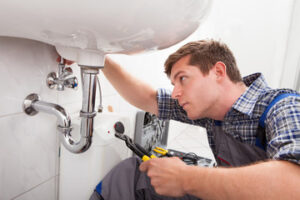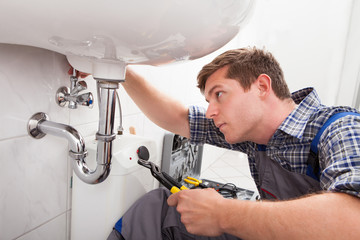Plumbers are trained professionals who specialize in installing and repairing plumbing systems. They are responsible for troubleshooting plumbing systems and repairing worn parts. Plumbing can involve cutting holes in walls or hanging steel supports from ceiling joints. Pipe fittings and fixtures need to be sized correctly. Skilled plumbers also use soldering, solvent weld, crimp, and compression fittings to connect pipes. Licensed Plumbers are trained to use strict safety standards and meet local codes.
 There are a number of benefits to becoming a plumber. First of all, there is a high demand for qualified plumbers. Despite their high pay, plumbers risk contracting infections. Infections and other diseases can be transmitted through fecal matter or vomit. Furthermore, the sewage system is often contaminated, and it can cause plumbing issues. Hence, it is important to have the necessary training and certification.
There are a number of benefits to becoming a plumber. First of all, there is a high demand for qualified plumbers. Despite their high pay, plumbers risk contracting infections. Infections and other diseases can be transmitted through fecal matter or vomit. Furthermore, the sewage system is often contaminated, and it can cause plumbing issues. Hence, it is important to have the necessary training and certification.
Plumbers work in homes, businesses, and factories. Their jobs are diverse, ranging from large water lines to refrigerators. They can also install fixtures like toilets, dishwashers, and water heaters. Their job requires them to unclog pipes and maintain septic systems. As a result, plumbers are crucial to the health of a community. It is important to remember that plumbers need to be well-trained and screened for infectious diseases, so they must be certified.
In addition to being well-trained, plumbers should have at least a Certificate IV in Plumbing. This qualification allows a plumber to install and repair plumbing systems. The license is required in most states before a plumber can work independently. A plumbing job is not easy. However, you can build a strong portfolio and get steady work. A successful career in plumbing is rewarding, but it is not easy. A great starting salary can be found in this field.
The job of a plumber is not easy. There are many responsibilities and risks involved in a plumbing job. A plumbing project can be a complex undertaking, requiring a plumber to be skilled in every aspect of it. Regardless of the size of the project, a master plumber must be able to read blueprints and understand electrical wiring locations. While there is a shortage of qualified workers in this field, the demand is expected to increase in the near future.
A plumber’s work is highly valued in the construction industry. The World Health Organization (WHO) identifies plumbing as one of its front-line health workers. The plumber can design systems that provide clean water for proper hygiene, sanitizing operating rooms, and ensuring that the water supply reaches all appliances. The job of a plumber is inherently demanding, but it is rewarding and requires a wide range of skills.
A plumber can work with water. They must be able to lift heavy tools and equipment. They must be physically fit to carry out their jobs. A plumber must have a high school diploma and be at least 18 years old. Apprentices should be able to apply for positions in the construction industry as they will receive on-the-job training in plumbing. The apprenticeship will be sponsored by a trade union and last for four to five years. It requires 2,000 hours of on-the-job training and must have at least a year of experience.
In addition to residential plumbing, plumbers work with a variety of other plumbing trades. Their jobs vary widely in size and complexity. They can install water lines in buildings or refrigerators, install toilets, and water heaters, and unclog pipes. They can also maintain septic systems. The World Health Organization defines a plumber as a “plumber” with the ability to fix pipes. These skilled trades are in high demand all over the world, but there are many risks.
As a plumber, you need to have a Certificate IV in plumbing. This qualification is required in most states. As with any other plumbing trade, a license is mandatory to work independently. It is a must to have a valid license to work in the field. As a plumber, you can expect to earn between $38,000 and $47,000 per year. If you have experience and are licensed, you can even earn more. A plumbing apprenticeship will prepare you for the physical demands of the job.

